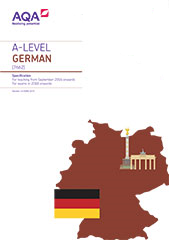3.2 Political and artistic culture
Students must study the themes and sub-themes below in relation to at least one German-speaking country.
Artistic culture in the German-speaking world
Students may study sub-themes Festivals and traditions and Art and architecture in relation to any German-speaking country or countries. Students must study The cultural life of Berlin in relation to Berlin.
- Festivals and traditions (Feste und Traditionen)
- Feste und Traditionen – ihre Wurzeln und Ursprünge
- Feste und Traditionen – ihre soziale und wirtschaftliche Bedeutung heute
- Vielfältige Feste und Traditionen in verschiedenen Regionen
- Art and architecture (Kunst und Architektur)
- Künstler und Architekten
- Kunst und Architektur im Alltag
- Kunst und Architektur – Vergangenheit, Gegenwart, Zukunft
- Cultural life in Berlin, past and present (Das Berliner Kulturleben damals und
heute)
- Berlin – geprägt durch seine Geschichte
- Theater, Musik und Museen in Berlin
- Die Vielfalt innerhalb der Bevölkerung Berlins
Aspects of political life in the German-speaking world
Students may study Politics and youth in relation to any German-speaking country or countries. Students must study the sub-themes Germany and the EU and German re-unification and its consequences in relation to Germany.
- Germany and the European Union (Deutschland und die Europaïsche Union)
- Die Rolle Deutschlands in Europa
- Vor- und Nachteile der EU für Deutschland
- Die Auswirkungen der EU-Erweiterung auf Deutschland
- Politics and youth (Die Politik und die Jugend)
- Politisches Engagement Jugendlicher
- Schwerpunkte der Jugendpolitik
- Werte und Ideale
- German re-unification and its consequences (Die Wiedervereinigung und ihre Folgen)
- Friedliche Revolution in der DDR
- Die Wiedervereinigung – Wunsch und Wirklichkeit
- Alte und neue Bundesländer – Kultur und Identität
